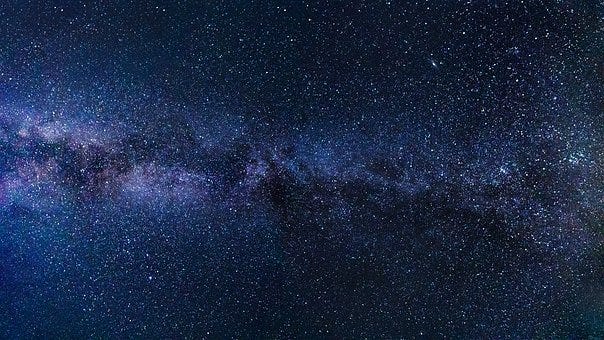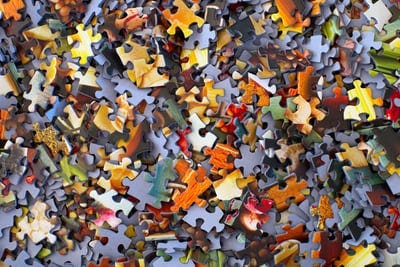There's a concept in physics known as entropy. And what entropy is, at a very basic level, is a measure of disorder.
And there is a law in physics, the Second Law of Thermodynamics, which states (again, in basic terms) that the entropy of any system (including our universe as a whole) will always increase over time.
Basically, as time passes, and the universe expands, there is a natural pull away from order and toward chaos.
One of my favorite writers, James Clear, illustrates this concept in this article, where he explains why the mathematical odds are so heavily in favor of disorder. He uses the analogy of throwing a box of puzzle pieces into the air. The pieces will almost surely land on the ground in a completely random arrangement. Is there a chance they could land as a perfectly formed puzzle? Sure, but that is only one potential iteration out of nearly infinite possible outcomes, and therefore the odds are almost entirely in favor of disorder.
It’s not just among stars barreling through the universe or puzzle pieces flying through the air where we witness this trend toward disorder.
Entropy permeates every part of our lives.
Consider our attempts to control nature. We have beautiful lawns, gardens, and even golf courses. They are neat and clean and orderly. But what happens when we neglect them? They quickly succumb to this natural pull toward disorder. They are overcome by weeds and trees and... nature. My wife and I were married at a beautiful resort on South Carolina's Daufuskie Island. After our wedding, the resort fell victim to the financial crisis and went bankrupt. Ultimately, nature reclaimed the golf course, including the 18th hole that we looked over as we said our vows. Entropy.
Have you ever owned a home? If so, you'll know about this natural tendency toward disorder. The paint on our shudders chips and peels over time. The shingles on our roofs buckle and dent from sunshine and hail. The minute you fix that leaky toilet, the air conditioner goes. Water finds its way into the basement. The hardwood floors get more nicked up by the day. Looking to accelerate the process? Just add a few kids to the mix. Chaos in more ways than one.
We witness entropy in our bodies as well. In many ways, they are very much the epitome of it.
As we age, what were once perfectly functioning systems start to break down. The pull toward disorder is strong. It takes the form of injuries, disease and ultimately death.
Our relationships are another example. They wilt unless given the proper attention.
Everything decays without constant attention.
I struggle against the force of entropy in my daily habits—from diet to exercise to meditation.
A few months back, I wrote this article about the ambitious plans I had for my daily habits. For a while, it went smoothly, with my constant attention. But slowly, a number of these habits started to erode. No dessert gave way to "one day a week" which gave way to "I'm not doing that today." Daily meditation gave way to every other day, which gave way to "I haven't done that in three days."
It happens. It's quite literally natural.
So what should we do about this? Should we just call it a day and admit we're overmatched?
No. This is where the "noble" part of the noble struggle comes in.
Everything is stacked against us. Nature wants us to fail. It wants our homes to decay, our bodies to wither and our relationships to fade.
But the struggle is to push back on this. The struggle is to create some order when all the universe wants is disorder.
This is, in fact, what humans have done for millennia. Creating order where order should not exist.
Cities should not exist. Beautiful buildings or works of art should not exist. Effective treatments for diseases should not exist. Societies with rules and laws should not exist. These are all unnatural and it takes herculean efforts to maintain them from eroding and giving way to disorder.
At a fundamental level, humans (or any life for that matter) should not exist. The mathematical odds are almost infinitely against it. Think of the box of puzzle pieces.
Is this some proof of a higher being? Or is it simply a reflection of almost infinite iterations—one of which must eventually result in something resembling order? (i.e. a million monkeys on a million typewriters for a million years eventually writing Shakespeare)
I don't know.
Yet somehow it exists. And at the risk of overstating the importance of this concept of entropy, it's possible that the purpose of life itself is exactly this.
This struggle to create order where order should not exist.
To hold off the forces of nature for one more hour, one more day, or one more generation so that our kids can pick up the mantle and do the same.
They say it's the journey not the destination. It's the same with the struggle.
Are we ever going to get there? To that perfect state of order? It seems unlikely. But that's not the point.
The point is to keep up the fight. For one more day.
Thank you as always for reading. If you think a friend may benefit from reading this or from joining the Intentional Wisdom community, please feel free to share this via email or social media. I will be back next week! - Greg
Note: I am clearly not a physicist so hopefully I haven’t butchered this concept too much. I don’t remember entropy being taught in my high school physics class. I do, however, remember my teacher claiming that I was “too social” that year, so perhaps I missed it. No matter. You can go down a rabbit hole on this subject if you’re so inclined. In addition to James Clear’s article cited above, I’d also point you to this piece from Shane Parrish if you’d like to read more.
Photo credits:
Space: Felix Mittermeier @ Pixabay.com
Puzzle: Hans-Peter @ Unsplash.com
Vines: Kelly Tungay @ Unsplash.com





